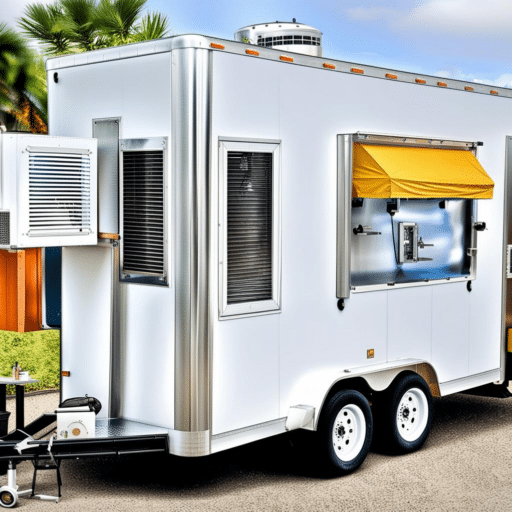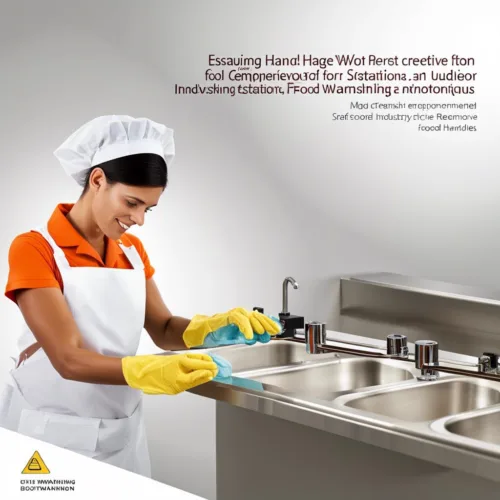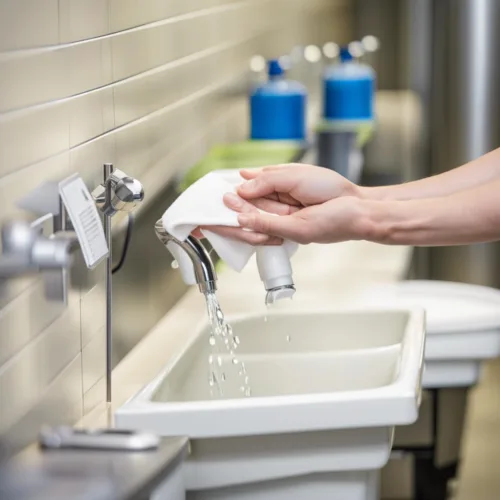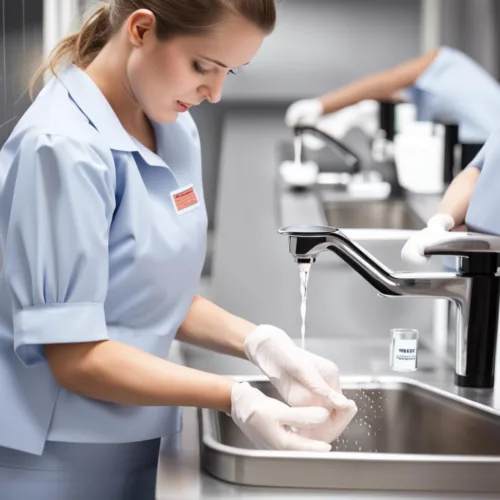Where Can a Food Worker Wash? There was something significant that every food worker needed to know. It was a secret that could keep everyone safe and healthy. Can you guess what it was? Yes, you’re right! It was all about washing hands! But ? Let’s find out together!
Imagine you are a food worker and spend your days cooking and preparing scrumptious meals for others to enjoy. But did you know our hands carry invisible germs that can make people sick? That’s why food workers must wash their hands properly. But where, oh where, can they do it?
Food workers have special spots called handwashing stations with a sink, clean water, soap, and paper towels. It’s like a spa for hands without fancy scents and bubbles!
Food workers cannot wash their hands anywhere they want because they need to do it in specific areas to avoid contaminating the food they prepare. They use designated handwashing stations to keep germs away from the food, ensuring its safety and taste.
Handwashing is highly emphasized in childcare and food preparation areas. Special rules and guidelines are in place to ensure proper handwashing techniques. Workers must use soap, scrub their hands for 20 seconds, and dry them thoroughly. It’s like a dance for your hands!
Handwashing stations are crucial for food workers to maintain safety. By using these spots, they ensure germ-free meals and protect our health. Remember to keep your hands clean!
Remember, handwashing is essential for everyone, not just food workers. So let’s all join hands (clean hands, of course!) in fighting those sneaky germs and keeping ourselves healthy and happy!
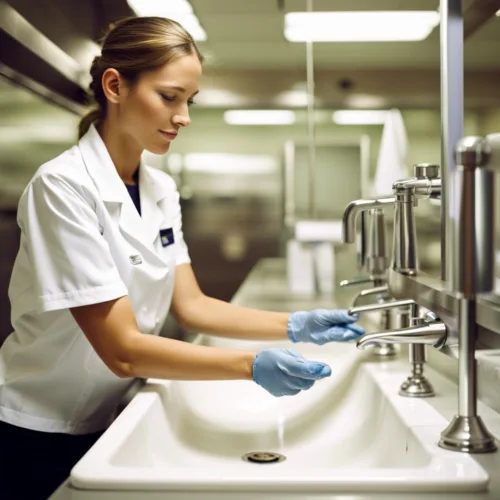
Table of Contents
- Ensuring Proper Hand Hygiene for Food Workers: A Comprehensive Guide
- The Importance of Designated Handwashing Stations in Food Service Industry
- Expert Recommendations for Establishing Suitable Handwashing Facilities in Food Work Environments
- Implementing Effective Handwashing Techniques to Prevent Foodborne Illnesses
- Q&A
- Closing Remarks
Where Can A Food Worker Wash: A Comprehensive Guide
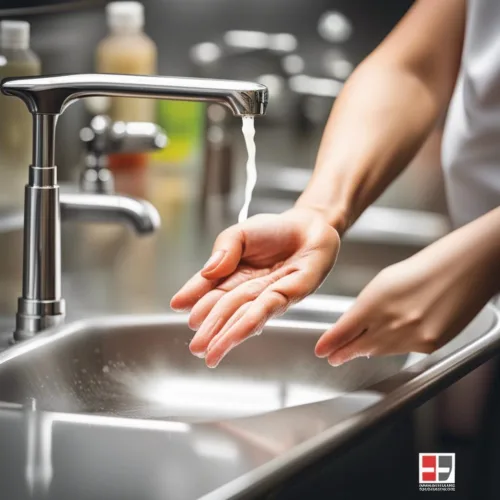
To stay safe, food workers must wash hands in a special place called a handwashing station, usually found in restaurant kitchens or food preparation areas.
At a handwashing station, food workers find warm running water and soap. They make bubbles on their hands with soap and rub them together to clean all parts. It takes at least 20 seconds, about two times, to sing “Happy Birthday” to scrub their hands thoroughly.
After washing their hands, they should rinse them under running water to remove soap and germs. Then, they can dry their hands with a clean towel or paper towel. This helps prevent germs from contaminating the food during preparation.
Remember, it’s important for food workers to wash their hands before they start preparing food, after they touch raw meat or other things that might have germs, after they use the bathroom and any time their hands get dirty. This helps keep everyone healthy and safe!
A handwashing station is a special place where food workers can wash their hands to remove germs. They must scrub for 20 seconds, rinse, and dry with a clean towel. Proper hand hygiene helps prevent the spread of germs and keeps everyone safe.
The Importance of designated Handwashing Stations in Food Service Industry
As a restaurant food worker, handwashing is crucial for your health and others. Handwashing stations are designated areas in the food service industry for this purpose, essential for maintaining hygiene.
At these handwashing stations, there’s a sink with running water to rinse away dirt, germs, and food particles from your hands. Seeing the water flowing down the sink like a little waterfall is cool. Remember, washing your hands with water is important to thoroughly clean and remove any nasties that can make you or others sick.
Next to the sink, you will usually find soap. Soap is like magic! Rubbing it on your hands creates lots of bubbles that stick to the germs and help wash them away. So, after wetting your hands with water, you should squirt some soap onto them. Then, rub your hands together, cleaning all the nooks and crannies, like between your fingers and under your nails.
After washing your hands for 20 seconds, rinse them thoroughly with water to remove soap and germs. Let the water flow down the sink, shaking your hands or using a clean towel to dry them.
You have everything you need at designated handwashing stations to wash your hands properly. They have sinks with running water, soap, and clean towels. It’s important to use these stations before preparing or eating food. Doing so, you help prevent the spread of germs and keep yourself and others healthy. Clean hands are happy hands!
Where Can a Food Worker Wash ? Expert Recommendations for Establishing Suitable Handwashing
In a food work environment, it is essential for food workers to maintain good hygiene by washing their hands regularly. Handwashing helps to prevent the spread of bacteria and other germs that can cause foodborne illnesses. Now, you may be wondering,? Let me explain it to you in simple terms.
Food workers can wash their hands at designated sinks in or near the food preparation area. These sinks have hot and cold running water, soap, paper towels, or hand dryers for drying hands.
Food workers should wet their hands under running water, apply soap, and scrub all surfaces, including palms, back of hands, between fingers, and under fingernails. Scrub for at least 20 seconds, rinse hands thoroughly under running water to remove dirt, bacteria, and germs.
After rinsing, she should dry her hands using a clean paper towel or hand dryer. It is important to dry your hands completely, as wet hands can easily spread germs. Once her hands are dry, she is ready to continue working with food.
Proper handwashing is crucial for a safe food work environment. Follow these steps every time to effectively remove contaminants. Regular and proper handwashing helps prevent foodborne illnesses.
Where Can a Food Worker Wash ? Implementing Effective Handwashing Techniques to Prevent Foodborne Illnesses
To stop foodborne illnesses, food workers must wash their hands properly. Now, let me simplify it for you.
When preparing food, the worker must locate a designated handwashing station. These stations are usually near food preparation areas or restrooms equipped with a sink, soap, and water. Look for a sign that says “Handwashing Station”.
To wash hands, a food worker finds the station and turns on the faucet for water. They then use soap to create a lather and remove dirt and germs. Hot water is not necessary.
The food worker must wash her hands with soap for 20 seconds, rinse thoroughly, and dry completely to prevent bacteria growth.
Remember, proper handwashing is important not only for food workers but also for everyone. It helps to keep us all healthy and prevents the spread of harmful germs. So, the next time you see a food worker, you can rest assured knowing that she knows exactly where to go to wash her hands and keep our food safe and delicious.
Just like that, we’ve learned about it. Remember, finding the handwashing station, using soap and water, rinsing off the soap, and drying our hands are all important steps to keeping ourselves and others healthy and happy. Stay clean and be safe!
[2]
Q&A About Where Can a Food Worker Wash
Q: Where Can a Food Worker Wash?
Food workers should wash their hands at designated stations in kitchens or food preparation areas equipped with sinks, soap, and water to prevent germ spread. CDC stresses frequent handwashing with soap and water, particularly while handling and preparing food. Hand hygiene is crucial for protecting against illness-causing germs and ensuring food safety. [1] [2] [3]
Closing Remarks
In conclusion, the importance of handwashing for food workers cannot be understated. As we have explored the challenging complexity surrounding handwashing behavior, it becomes evident that where food workers can wash their hands plays a crucial role in ensuring food safety and preventing contamination. From a combined socioecological and intersectional perspective, we have highlighted the significance of providing accessible and hygienic handwashing facilities for food workers, particularly in countries like Sierra Leone. By recognizing the diverse needs and contexts in which food workers operate, we can strive to create environments that empower them to maintain proper hand hygiene, thereby safeguarding public health and well-being. Remember, clean hands save lives.[1]
Tags: food safety, food worker, hand washing, hygiene